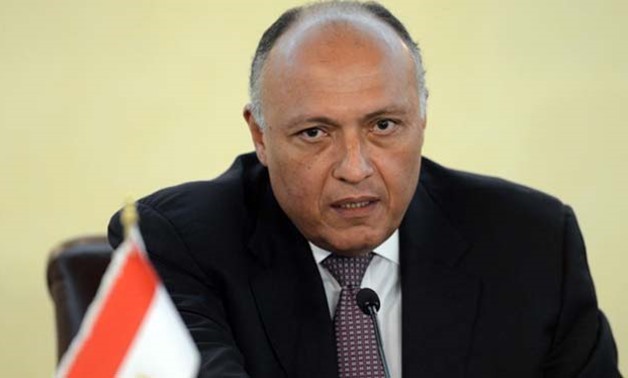
Shoukry and Pompeo discuss bilateral relations including the economic, military, and development aspects of the USAID’s program in Egypt - File Photo
CAIRO - 7 August 2018: Egyptian Foreign Affairs Minister Sameh Shoukry departed Monday to the United States where he is set to meet his American counterpart Mike Pompeo, U.S. National Security Advisor John Bolton, and members of the American Chamber of Commerce.
The talks will cover issues and challenges pertinent to the region’s stability and security as well as outlining the timetable for strategic discussions by the defense and foreign ministers of both countries.
Shoukry and Pompeo will discuss bilateral relations including the economic, military, and development aspects of the USAID’s program in Egypt. The Egyptian minister will brief his counterpart on the socio-economic reforms program adopted by the country to boost production, and achieve stability and growth.
Shoukry will also showcase Egypt’s counter-terrorism efforts and the success accomplished by the Comprehensive Operation - Sinai 2018.
During his two-day visit, the minister will meet the representatives of top American companies investing or willing to invest in Egypt, take part in roundtable talks with key figures at research centers, and give media interviews.
Military Aid
The United States will very soon lift the hold on aid to Egypt after talks with an Egyptian military delegation, a source told Ahram Online in July.
The high-profile delegation, named the Military White Paper, is currently in Washington holding meetings with high-ranking U.S. military and security officials.
The $195 million military aid – withheld in August 2017 over allegations of human rights and democracy breaches – will be released by the U.S. Senate Appropriations Committee.
The source told Ahram Online that Egypt made it clear during the talks that such a stance would send a "wrong message that U.S. counterparts do not understand the nature of the challenges Egypt is facing, including the challenge of domestic and regional terrorism.”
Egypt and Israel receive U.S. military aid as part of the peace treaty signed in 1979. The annual amount allocated for Egypt is $1.3 billion. On the other hand, Israel and the United States signed an agreement in September 2016 for the latter to provide Israel with $35 billion in defense aid over the period of 10 years.
Since the year the peace treaty was signed, Israel has received $8 billion in economic aid yearly, while Egypt has received $1 billion.
Egypt has refuted the United States' claims pulled out of the United Nations Human Rights Council (UNHRC) in June of being biased against Israel.
During his meeting with Head of the National Council for Human Rights (NCHR) Mohamed Fayek in September, President Abdel Fatah al-Sisi affirmed that Egypt will continue its efforts to maintain human rights and basic freedoms in line with confronting terrorism and protecting its national security from current dangers threatening the region.
Egypt has been engaged in a fight with terror in North Sinai since 2011 in parallel with January 25 Revolution. However, the attacks targeted civilians – especially Christians – and public institutions in the rest of the country after the ouster of former President Mohamed Morsi, who is affiliated with the outlawed Muslim Brotherhood, in July 2013. Later on, the assaults were confined again to the border governorate.
Sinai 2018
The operation launched in February accomplished the following:
- Terrorist leaders were targeted in North and Central Sinai, and several terrorist hotbeds were identified and destroyed, while a large number of terrorists, criminals and suspects were killed or arrested.
- Destruction of terrorism infrastructure in North Sinai, such as tunnels, weapons and ammunition stores, improvised explosive devices, vehicles and motorcycles, explosive materials, mines and rockets.
- Recovering state sovereignty in the areas cleared of terrorists and deploying civilian police to ensure security of these places.
- Securing the previous presidential election and the secondary exams in North Sinai and the return of students to the University of Arish.
- Securing transportation of commodities to Sinai and movement of people to and from the border governorate.
- Cutting supply to terrorist elements, and preventing smuggling of weapons and ammunition, as well as the infiltration of terrorist elements into the country.


Comments
Leave a Comment